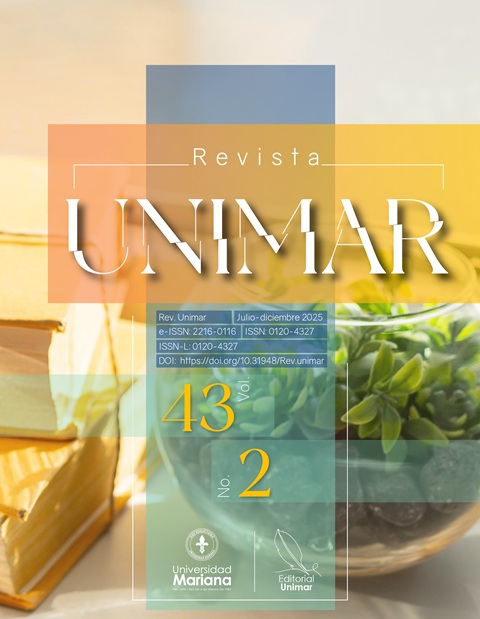Interculturalidad crítica y CALL en la enseñanza del inglés: revisión de una década de investigación en Colombia
DOI:
https://doi.org/10.31948/ru.v43i2.4709Palabras clave:
interculturalidad, tecnologías de la información y la comunicación, aprendizaje, lenguas, inglésResumen
Este artículo examina los estudios publicados en cuatro revistas colombianas entre 2014 y 2023. Se revisaron 91 ediciones para identificar artículos que abordaran uno o varios de los siguientes temas: enseñanza del inglés (ELT), interculturalidad crítica (CI) y aprendizaje de idiomas asistido por computador (CALL). La metodología siguió el proceso de tres pasos propuesto por Álvarez-Valencia (2014) y principios del Critical Appraisal Skills Programme (CASP). El proceso de inclusión de artículos consistió en la revisión de títulos, resúmenes, palabras clave, y posteriormente la clasificación por tipo de investigación y enfoque temático. De un total de 791 artículos, se seleccionaron 129 (99 nacionales y 30 internacionales) para su análisis. Los hallazgos revelan un creciente interés en la CI, expresado mayoritariamente en artículos reflexivos y revisiones teóricas centradas en la educación superior. La investigación empírica sobre esta temática sigue siendo limitada, especialmente en los niveles escolares y con participación docente. CALL, por su parte, ha sido abordado principalmente desde enfoques convencionales centrados en el desarrollo de habilidades lingüísticas, sin integrar perspectivas críticas o decoloniales. La intersección entre CI y CALL permanece como un campo incipiente en la investigación colombiana, con una ausencia casi total de estudios que aborden ambas dimensiones a nivel escolar. Estos hallazgos evidencian no solo la necesidad de impulsar estudios empíricos en estos niveles, sino también de construir propuestas pedagógicas críticas mediadas por tecnología que promuevan actitudes interculturales transformadoras. En consecuencia, el presente estudio contribuye a la generación de acciones vinculadas a la descolonización del ELT, ya que como lo señala Granados-Beltrán (2018), estas acciones están conectadas con el ejercicio mismo de investigación.
Biografía del autor/a
Andrés Mauricio Potes-Morales, Universidad del Valle
Profesor, IETI José María Carbonell, Cali; integrante del grupo de investigación EILA, Universidad del Valle, Cali, Colombia
Referencias bibliográficas
Álvarez-Valencia, J. A. (2014). Developing the intercultural perspective in foreign language teaching in Colombia: A review of six journals. Language and Intercultural Communication, 14(2), 226-244. https://doi.org/10.1080/14708477.2014.896922 DOI: https://doi.org/10.1080/14708477.2014.896922
Álvarez-Valencia, J. A., & Fernández-Benavides, A. (2019). Using social networking sites for language learning to develop intercultural competence in language education programs. Journal of International and Intercultural Communication, 12(1) 23-42. https://doi.org/10.1080/17513057.2018.1503318 DOI: https://doi.org/10.1080/17513057.2018.1503318
Aristizábal-Jiménez, Y. (2020). Fostering talk as performance in an EFL class through the critical analysis of YouTubers' content. Profile, 22(2), 181-195. https://doi.org/10.15446/profile.v22n2.82510 DOI: https://doi.org/10.15446/profile.v22n2.82510
Ballén, D. (2014). The role of blogs and web resources in students' autonomous learning awareness. HOW, 21(2), 10-30. https://doi.org/10.19183/how.21.2.2 DOI: https://doi.org/10.19183/how.21.2.2
Beatty, K. (2010). Teaching and Researching: Computer-Assisted Language Learning (2nd ed.). Routledge. https://doi.org/10.4324/9781315833774
Bedoya, P. A. (2014). The exercise of learner autonomy in a virtual EFL course in Colombia. HOW, 21(1), 82-102. https://doi.org/10.19183/how.21.1.16 DOI: https://doi.org/10.19183/how.21.1.16
Bettney, E. (2022). Examining hegemonic and monoglossic language ideologies, policies, and practices within bilingual education in Colombia. Íkala, 27(1), 249-270. https://doi.org/10.17533/udea.ikala.v27n1a12 DOI: https://doi.org/10.17533/udea.ikala.v27n1a12
Blyth, C. (2008). Research perspectives on online discourse and foreign language learning. In S. M. Pierce (Ed.), Mediating discourse online (pp. 47-70). John Benjamins. https://doi.org/10.1075/aals.3.05bly DOI: https://doi.org/10.1075/aals.3.05bly
Bolaños, F., Florez, K., Gómez, T., Ramirez, M., & Tello, S. (2018). Implementing a community-based project in an EFL rural classroom. Colombian Applied Linguistics Journal, 20(2), 274-289. https://doi.org/10.14483/22487085.13735 DOI: https://doi.org/10.14483/22487085.13735
Byram, M. (1997). Teaching and assessing intercultural communicative competence. Multilingual Matters.
Cadena-Aguilar, R. F., Ortega-Cuellar, J. H., & Cadena-Aguilar, A. (2019). Daily 6: An approach to foster oral fluency of English as a foreign language in adolescents. Profile, 21(2), 29-44. https://doi.org/10.15446/profile.v21n2.71364 DOI: https://doi.org/10.15446/profile.v21n2.71364
CALJ. (2024). Colombian Applied Linguistics Journal. https://revistas.udistrital.edu.co/index.php/calj/about
CASP, (2024). CASP Checklist: CASP Qualitative Studies Checklist. In Critical Appraisal Skills Programme. https://casp-uk.net/casp-tools-checklists/
Casanovas, M. (2002). Internet en la didáctica de las lenguas extranjeras: un paso adelante [The Internet in foreign language teaching: a step forward]. Íkala, 7(13), 53-60. https://doi.org/10.17533/udea.ikala.3209 DOI: https://doi.org/10.17533/udea.ikala.3209
Chapelle, C., & Jamieson, J. (2008). Tips for teaching with CALL-Practical approaches to computer-assisted language learning tips on teaching. Pearson Education.
Contreras, J. J., & Chapetón, C. M. (2016). Cooperative learning with a focus on the social: A pedagogical proposal for the EFL classroom. HOW, 23(2), 125-147. https://doi.org/10.19183/how.23.2.321 DOI: https://doi.org/10.19183/how.23.2.321
Elaish, M., Shuib, L., Ghani, A., & Yadegaridehkordi, E. (2019). Mobile English Language Learning (MELL): a literature review. Educational Review, 71(2), 257-276. https://doi.org/10.1080/00131911.2017.1382445 DOI: https://doi.org/10.1080/00131911.2017.1382445
Freire, P. (1987). Pedagogía del Oprimido [Pedagogy of the Oppressed]. (36th ed.) Siglo XXI Editores.
Gálvez, J. D., & Del Campo, M. (2023). Strengthening reading competence in English using a reading comprehension module. Profile, 25(1), 229-243. https://doi.org/10.15446/profile.v25n1.101251 DOI: https://doi.org/10.15446/profile.v25n1.101251
Galvis, H. A. (2015). Laying the foundations for video-game based language instruction for the teaching of EFL. HOW, 22(1), 107-122. https://doi.org/10.19183/how.22.1.136 DOI: https://doi.org/10.19183/how.22.1.136
Granados-Beltrán, C. (2016). Critical interculturality. A path for pre-service ELT teachers. Íkala, 21(2), 171-187. https://doi.org/10.17533/udea.ikala.v21n02a04 DOI: https://doi.org/10.17533/udea.ikala.v21n02a04
Granados-Beltrán, C. (2018). Revisiting the need for critical research in undergraduate Colombian English language teaching. HOW, 25(1), 174-193. https://doi.org/10.19183/how.25.1.355 DOI: https://doi.org/10.19183/how.25.1.355
Granados-Beltrán, C. (2022). Disrupting colonial tensions in initial language teacher education: Criteria based on critical interculturality. Íkala, 27(3), 627-645. https://doi.org/10.17533/udea.ikala.v27n3a03 DOI: https://doi.org/10.17533/udea.ikala.v27n3a03
Gutiérrez, C. P. (2022). Learning English from a critical, intercultural perspective: The journey of preservice language teachers. Profile, 24(2), 265-279. https://doi.org/10.15446/profile.v24n2.97040 DOI: https://doi.org/10.15446/profile.v24n2.97040
Guzmán, D. Y., & Moreno, J. A. (2019). The use of Plotagon to enhance the English writing skill in secondary school students. Profile, 21(1), 139-153. https://doi.org/10.15446/profile.v21n1.71721 DOI: https://doi.org/10.15446/profile.v21n1.71721
Helg, A. (1987). La educación en Colombia 1918-1957. Una historia social, económica y política [Education in Colombia 1918-1957. A social, economic, and political history]. CEREC.
Henao, E. A., Gómez, J. O., & Murcia, J. H. (2019). Intercultural awareness and its misrepresentation in textbooks. Colombian Applied Linguistics Journal, 21(2), 179-193. https://doi.org/10.14483/22487085.14177 DOI: https://doi.org/10.14483/22487085.14177
Hodges, C., Moore, S., Locke, B., Trust, T., & Bond, A. (2020). The difference between emergency remote teaching and online learning. Educause Review. https://er.educause.edu/articles/2020/3/the-difference-between-emergency-remote-teaching-and-online-learning
HOW. (2024). How journal. https://www.howjournalcolombia.org/index.php/how
Hurie, A. H. (2018). ¿Inglés para la paz? Colonialidad, ideología neoliberal y expansión discursiva en Colombia Bilingüe [English for peace? Coloniality, neoliberal ideology, and discursive expansion in bilingual Colombia]. Íkala, 23(2), 333-354. https://doi.org/10.17533/udea.ikala.v23n02a09 DOI: https://doi.org/10.17533/udea.ikala.v23n02a09
Íkala. (2024). Íkala, journal of language and culture. Íkala. https://revistas.udea.edu.co/index.php/ikala/about
Jánica, D., Rey, L., & Rosado, N. (2006). Characteristics of effective intercultural multimedia material in the English language class. HOW, 13(1), 153-164.
Jin, L., Deifell, E., & Angus, K. (2022). Emergency remote language teaching and learning in disruptive times. CALICO JOURNAL, 39(1), i-x. https://doi.org/10.1558/cj.20858 DOI: https://doi.org/10.1558/cj.20858
Lastra, S., Durán, N., & Acosta, D. (2018). Community based pedagogy as an eye-opening for pre-service teachers' initial connections with the school curriculum. Colombian Applied Linguistics Journal, 20(2), 209-229. https://doi.org/10.14483/22487085.13047 DOI: https://doi.org/10.14483/22487085.13047
Levy, M., & Hubbard, P. (2005). Why call CALL "CALL"? Computer Assisted Language Learning, 18(3), 143-149. https://doi.org/10.1080/09588220500208884 DOI: https://doi.org/10.1080/09588220500208884
Liaw, M. (2006). E-learning and the development of intercultural competence. Language Learning and Technology, 10(3), 49-64. https://doi.org/10.64152/10125/44074 DOI: https://doi.org/10.64152/10125/44074
Ministerio de Educación Nacional (MEN). (n.d.). Serie: Lineamientos Curriculares. Idiomas Extranjeros [Series: Curriculum Guidelines for Foreign Languages]. Ministerio de Educación Nacional. https://www.mineducacion.gov.co/1621/articles-339975_recurso_7.pdf
Ministerio de Educación Nacional (MEN). (2006). Formar en lenguas extranjeras: el reto. Serie Guías No. 22 [Foreign Language Training: The Challenge. Guide Series No. 22]. Ministerio de Educación Nacional. https://santillanaplus.com.co/pdf/estandares-basicos-de-competencias.pdf
Neiva-Montaño, H. K. (2021). Developing oral interaction skills in foreign language learners through media literacy. Colombian Applied Linguistics Journal, 23(1), 3-16. https://doi.org/10.14483/22487085.13373 DOI: https://doi.org/10.14483/22487085.13373
Nieto, Y. (2018). Promoting the use of local literacies in EFL pre-service teachers to inspire their teaching practice. Colombian Applied Linguistics Journal, 20(2), 263-273. https://doi.org/10.14483/22487085.13005 DOI: https://doi.org/10.14483/22487085.13005
Núñez-Pardo, A. (2020). Inquiring into the Coloniality of Knowledge, Power, and Being in EFL Textbooks. HOW, 27(2), 113-133. https://doi.org/10.19183/how.27.2.566 DOI: https://doi.org/10.19183/how.27.2.566
Ochoa, D. P., & Medina, N. (2014). A virtual room to enhance writing skills in the EFL Class. HOW, 21(1), 62-81. https://doi.org/10.19183/how.21.1.15 DOI: https://doi.org/10.19183/how.21.1.15
Peng, B. (2018). Study on cultivation of intercultural communication competence of college English based on modern information technology. iJET, 13(9), 29-40. https://doi.org/10.3991/ijet.v13i09.8724 DOI: https://doi.org/10.3991/ijet.v13i09.8724
Perales, M. D. (2013). Teaching intercultural awareness in the English as a foreign language classroom: a case study using critical reading. Intercultural Education, 24(3), 251-263. https://doi.org/10.1080/14675986.2013.793037 DOI: https://doi.org/10.1080/14675986.2013.793037
Pontificia Universidad Javeriana y Laboratorio de Economía de la Educación (LEE). (2022). Brechas territoriales en resultados de Pruebas Saber 11: Regiones y departamentos antes y durante la pandemia por covid-19 [Territorial gaps in Saber 11 test results: Regions and departments before and during the COVID-19 pandemic]. https://lee.javeriana.edu.co/documents/5581483/5629089/N.-49-Informe-Saber11-brechas-regionales-2022-LEE-JAVERIANA.pdf/94059819-3e97-fa6f-28da-46513b0f79cb?t=1652824160000
Profile. (2024). Profile: Issues in teachers' professional development. https://revistas.unal.edu.co/index.php/profile
Quitián-Bernal, S. P., & González-Martínez, J. (2022). La lectura digital en la modalidad blended-learning. Una perspectiva educativa [Digital reading in the blended-learning modality. An educational perspective]. Colombian Applied Linguistics Journal, 24(1), 51-66. https://doi.org/10.14483/22487085.17681 DOI: https://doi.org/10.14483/22487085.17681
Restrepo, E., & Rojas, A. (2010). Inflexión decolonial: fuentes, conceptos y cuestionamientos [Decolonial inflection: sources, concepts and questions]. Editorial Universidad del Cauca.
Rodríguez, I. Y, & Vargas, L. J. (2020). Schoology: una herramienta para el desarrollo de la habilidad escrita en inglés [Schoology: A Tool for the Development of English written skill]. Colombian Applied Linguistics Journal, 22(1), 13-28. https://doi.org/10.14483/22487085.14348 DOI: https://doi.org/10.14483/22487085.14348
Sierra, A. M. (2016). Contributions of a social justice language teacher education perspective to professional development programs in Colombia. Profile, 18(1), 203-217. https://doi.org/10.15446/profile.v18n1.47807 DOI: https://doi.org/10.15446/profile.v18n1.47807
So-Yeon, A. (2015). Criticality for global citizenship in Korean English immersion camps. Language and Intercultural Communication, 15(4), 533-549. https://doi.org/10.1080/14708477.2015.1049612 DOI: https://doi.org/10.1080/14708477.2015.1049612
Techopedia. (2024). Computer. https://www.techopedia.com/definition/4607/computer
Tubino, F. (2005, January 24-28). La interculturalidad crítica como proyecto ético-político [Critical interculturality as an ethical-political project] [Conference session]. In Encuentro Continental de Educadores Agustinos. Lima, Perú [Continental Meeting of Augustinian Educators. Lima, Perú]. https://oala.villanova.edu/congresos/educacion/lima-ponen-02.html
Usma, J. A., Ortiz, J. M., & Gutiérrez, C. P. (2018). Indigenous students learning English in higher education: Challenges and hopes. Íkala, 23(2), 229-254. https://doi.org/10.17533/udea.ikala.v23n02a03 DOI: https://doi.org/10.17533/udea.ikala.v23n02a03
Uzun, L. (2014). Utilising technology for intercultural communication in virtual environments and the role of English. Procedia - Social and Behavioral Sciences, 116, 2407-2411. https://doi.org/10.1016/j.sbspro.2014.01.583 DOI: https://doi.org/10.1016/j.sbspro.2014.01.583
Walsh, C. (2010). Interculturalidad crítica y educación intercultural [Critical interculturality and intercultural education]. In J. T. Viaña, L. Tapia, & C. Walsh (Eds.), Construyendo interculturalidad crítica [Building critical interculturality] (pp. 75-96). Instituto Internacional de Integración del Convenio Andrés Bello.
Williams, V., Boylan, A.M., Nunan, D. (2020). Critical appraisal of qualitative research: necessity, partialities, and the issue of bias. BMJ Evidence-Based Medicine, 25, 9-11. https://doi.org/10.1136/bmjebm-2018-111132 DOI: https://doi.org/10.1136/bmjebm-2018-111132
Cómo citar
Descargas
Publicado
Número
Sección
Licencia
Derechos de autor 2025 Revista UNIMAR

Esta obra está bajo una licencia internacional Creative Commons Atribución 4.0.
Los autores que publiquen en esta revista aceptan las siguientes condiciones:
1. Los autores conservan los derechos de autor y ceden a la revista el derecho de la primera publicación, con el trabajo registrado con la licencia de atribución de Creative Commons, que permite a terceros utilizar lo publicado siempre que mencionen la autoría del trabajo y a la primera publicación en esta revista.
2. Los autores pueden realizar otros acuerdos contractuales independientes y adicionales para la distribución no exclusiva de la versión del artículo publicado en esta revista (p. ej., incluirlo en un repositorio institucional o publicarlo en un libro) siempre que indiquen claramente que el trabajo se publicó por primera vez en esta revista.
3. Se permite y recomienda a los autores publicar su trabajo en Internet (por ejemplo en páginas institucionales o personales) antes y durante el proceso de revisión y publicación, ya que puede conducir a intercambios productivos y a una mayor y más rápida difusión del trabajo publicado (veaThe Effect of Open Access).
| Estadísticas de artículo | |
|---|---|
| Vistas de resúmenes | |
| Vistas de PDF | |
| Descargas de PDF | |
| Vistas de HTML | |
| Otras vistas | |








